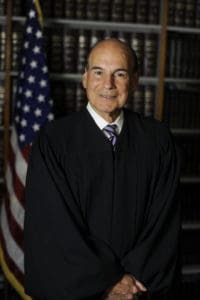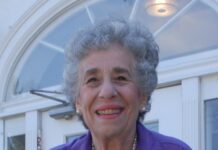By Dan Murphy
YONKERS — Yonkers Rising recently interviewed Yonkers City Court Chief Judge Michael Martinelli to discuss his 22 years on the city bench, what he has seen over the past three decades, and what drives him to continue to hear cases and deliver justice to the people.
 Martinelli was first elected in 1995 and has been elected and re-elected Judge citywide. For half of his 22 years on the bench, he has served as the chief supervising judge for the Yonkers courts, managing the seven judges and a courthouse staff of 50.
Martinelli was first elected in 1995 and has been elected and re-elected Judge citywide. For half of his 22 years on the bench, he has served as the chief supervising judge for the Yonkers courts, managing the seven judges and a courthouse staff of 50.
“I can’t believe how time has gone by,” he said. “The chief judge assigns the judges to the different parts (different courts that preside over specific cases, like landlord tenant, traffic, small claims, criminal, drugs, veterans) and I try to put the judges in their best spot. Everyone has their strengths and I try to move them into a part that favors their strength to make the courts run as efficiently as possible.
“I love the job. Before I was a judge I was a lawyer for 20 years, and had been president of the Yonkers Lawyers Association. I felt that I had good experience trying cases to become a judge and preside fairly and justly. I have always tried to do the right thing, and the best place to do it is on the bench.
“The other important part of being a judge is to be involved in your community,” continued Martinelli. “When I first got elected I was rated ‘highly qualified,’ but I also brought my experience from the community, or hard work from having a paper route as a kid, to working for my dad’s Gazette Press, but also in volunteer capacities as a Little League coach, or presiding over the Moot Court in Yonkers High School, and the PAL Poster Contest. I believe that all of these experiences help you serve the people as a judge.”
Martinelli also serves as the judicial representative on the Community Planning Council, a group that brings together different parts of city government, non-profits, and the Board of Education, to try and find solutions to concerns from the people of Yonkers. “We try to find ways to facilitate things and look at it from a different perspective,” he said. “We all know that resources are thin, so to the extent that you can bring folks together and try to meet a need, whether it’s for housing, or food, I’m delighted to be involved.”
We asked Martinelli what has changed in the Yonkers Courts during his 22 years.
“When I got elected we had six judges and six parts,” he said. “We would rotate through the different parts and stay there for a month. Now the so-called problem-solving courts were instituted under State Chief Court Judges Kaye and Littman.
“Former Yonkers City Court Chief Judge Arthur Doran ran the Drug Court and I assisted. It was one of the first Drug Courts in the country and a wonderful program. Those who come before the Drug Court get treatment and if they finish the program, their charges are wiped out. It’s great for the taxpayers and for the families of those charged.
“We also have a dedicated domestic violence part, so the days where you go to one court for everything is over,” continued Martinelli. “We also got a seventh part for Yonkers and seven judges, which helped greatly. We met with Assemblymember Shelley Mayer and she got involved and thanks to her and the rest of the state delegation, we got a seventh judge, which was necessary.”
What hasn’t changed over the past 22 years in the Yonkers courts?
“I’ve been here through a bunch of different mayors and the bipartisan cooperation between City Hall and the courthouse never changes,” he said. “Whatever issues come up, they are always involved and help in an amicable way.
“The Yonkers City Court is easily the busiest court in Westchester and one of the busiest in New York State. The seven judges continue to receive training in domestic violence, veterans’ affairs, and the Drug Court, to maximize the effectiveness of the judges and their courts, for the people who are heard before them.”
The veterans’ part of the Yonkers City Court is not known to many residents.
“Our Veterans’ Court is not as prominent as the Drug Court,” said Martinelli. “What we try to do is identify veterans when they come before us and direct them to veterans’ services available to them. A lot of veterans are embarrassed and don’t want to identify as veterans, but we try to help them as much as we can.”
What is the toughest part of the job?
“Issuing a Judgement of Eviction, even after a tenant has a full opportunity to be heard,” said Martinelli. “This is somebody’s home or house, and they have had problems and have experienced difficult times to get evicted. Years on the bench, and it’s still hard to do.
“It’s also difficult for the most part to put someone in jail, especially young people,” he continued. “We try to offer all possible alternatives to incarceration. For someone who wants to enlist in the military they have to have a clean record, so there are alternatives like boot camps, and parenting classes, probation – anything to avoid jail. Sometimes it doesn’t work but we make it available and give them the benefit of the doubt.”
Martinelli also said that Pro-Se litigants, or persons who want to represent themselves in court, can sometimes be a challenge. “If you are charged with a crime or violation of the City Code, you can be assigned an attorney,” he said. “Some are better than others but, hey, 18 attorneys in my court offer good, top notch representation. xxxxxxxx
“But for those who are in Landlord-Tennant Court, or Traffic Court, and the litigants are representing themselves, we always want to make sure that the parties are heard and treated courteously and try to put them at ease. Some are here for the first time and are terrified of the process. People skills come in handy when we interact with these cases.”
What is most rewarding?
“Turning someone’s life around, and it happens in Drug Court when the conviction is vacated (after the defendant completes treatment or other mandated program),” said Martinelli. “Nothing compares to seeing a mother saying they got their son or daughter back, or allowing the defendant to look at themselves in the mirror with pride. We have a great team in the Drug Court that helps make this happen.”
Martinelli said the “scourge of drugs, and opioids,” going on in all of society, also hits home in Yonkers. “We had a tragedy in the Drug Court when one of our defendants tested clean and completed the program,” he said. “Two nights later they overdosed and died. Attending that wake was very tough.”
The Yonkers chief judge said that the staff at the City Courthouse, “is always available and they are knowledgeable and courteous. If you bring a small claims action, it can be up to $5,000 in value, you can do it without a lawyer and sue anybody, not just persons in Yonkers,” he said. “Our doors are always open and you can get answers to most questions by asking.”
Is it a good policy to elect our judges?
“There are pluses and minuses to each side,” said Martinelli. “I think it’s better to let the voters decide. Let them make an informed judgement and let judges campaign for it. But in judicial campaigns you are ethically barred from speaking ill of your opponent. I wish all campaigns were that way. Judicial races can’t be negative in any way.”
Martinelli gets along great with the other judges in the Yonkers Courts. “We are like a mid-size law firm, bouncing off ideas with each other and using the different backgrounds that we all bring to the table,” he said. “We try to take advantage of our different life experiences and it’s very collegial.”
Martinelli comes from a politically famous family in Yonkers. His father, Angelo, served as mayor for many years, and his brother Richard served as City Council president. “I’ve been raised in an atmosphere of public service,” he said. “My dad was mayor and he remains quite active on many boards. He continues his public service and it serves as a great lesson to me.”
Martinelli is married to Jeanne Martinelli, formerly Jeanne Vergari, daughter of legendary Westchester District Attorney Carl Vergari. “Jeanne’s dad was district attorney for 25 years and professionally respected by all,” he said. “I always try to conduct myself like my dad and my father-in-law. The lessons that I have learned from both of them, and the inner workings of government, have helped me in my service as a judge.”
Have you ever considered running for higher office, or another judgeship?
“I love my job,” said Martinelli. “For me it’s a dream job that lets me serve my community. I have been elected three times in the city that I grew up in and that makes me feel good, that the people I know best want me to continue to administer justice.
“But by law I’m required to retire at age 70, and I just turned 67. I do believe that I’m too young to retire, so I am thinking about running for State Supreme Court where the retirement age is 76. That would be quite an honor for me, to finish on the Supreme Court.”
Yonkers City Court Judge Michael Martinelli is proof positive that someone who is qualified, and involved in their community, can serve the public good for 22 years, and counting. “It’s an exciting time to be a judge and I want to do it for as long as I can,” he said. “My motto in life is always try to do the right thing, You can’t go wrong with that.”
Yonkers Rising recently interviewed Yonkers City Court Chief Judge Michael Martinelli to discuss his 22 years on the city bench, what he has seen over the past three decades, and what drives him to continue to hear cases and deliver justice to the people.
Martinelli was first elected in 1995 and has been elected and re-elected Judge citywide. For half of his 22 years on the bench, he has served as the chief supervising judge for the Yonkers courts, managing the seven judges and a courthouse staff of 50.
“I can’t believe how time has gone by,” he said. “The chief judge assigns the judges to the different parts (different courts that preside over specific cases, like landlord tenant, traffic, small claims, criminal, drugs, veterans) and I try to put the judges in their best spot. Everyone has their strengths and I try to move them into a part that favors their strength to make the courts run as efficiently as possible.
“I love the job. Before I was a judge I was a lawyer for 20 years, and had been president of the Yonkers Lawyers Association. I felt that I had good experience trying cases to become a judge and preside fairly and justly. I have always tried to do the right thing, and the best place to do it is on the bench.
“The other important part of being a judge is to be involved in your community,” continued Martinelli. “When I first got elected I was rated ‘highly qualified,’ but I also brought my experience from the community, or hard work from having a paper route as a kid, to working for my dad’s Gazette Press, but also in volunteer capacities as a Little League coach, or presiding over the Moot Court in Yonkers High School, and the PAL Poster Contest. I believe that all of these experiences help you serve the people as a judge.”
Martinelli also serves as the judicial representative on the Community Planning Council, a group that brings together different parts of city government, non-profits, and the Board of Education, to try and find solutions to concerns from the people of Yonkers. “We try to find ways to facilitate things and look at it from a different perspective,” he said. “We all know that resources are thin, so to the extent that you can bring folks together and try to meet a need, whether it’s for housing, or food, I’m delighted to be involved.”
We asked Martinelli what has changed in the Yonkers Courts during his 22 years.
“When I got elected we had six judges and six parts,” he said. “We would rotate through the different parts and stay there for a month. Now the so-called problem-solving courts were instituted under State Chief Court Judges Kaye and Littman.
“Former Yonkers City Court Chief Judge Arthur Doran ran the Drug Court and I assisted. It was one of the first Drug Courts in the country and a wonderful program. Those who come before the Drug Court get treatment and if they finish the program, their charges are wiped out. It’s great for the taxpayers and for the families of those charged.
“We also have a dedicated domestic violence part, so the days where you go to one court for everything is over,” continued Martinelli. “We also got a seventh part for Yonkers and seven judges, which helped greatly. We met with Assemblymember Shelley Mayer and she got involved and thanks to her and the rest of the state delegation, we got a seventh judge, which was necessary.”
What hasn’t changed over the past 22 years in the Yonkers courts?
“I’ve been here through a bunch of different mayors and the bipartisan cooperation between City Hall and the courthouse never changes,” he said. “Whatever issues come up, they are always involved and help in an amicable way.
“The Yonkers City Court is easily the busiest court in Westchester and one of the busiest in New York State. The seven judges continue to receive training in domestic violence, veterans’ affairs, and the Drug Court, to maximize the effectiveness of the judges and their courts, for the people who are heard before them.”
The veterans’ part of the Yonkers City Court is not known to many residents.
“Our Veterans’ Court is not as prominent as the Drug Court,” said Martinelli. “What we try to do is identify veterans when they come before us and direct them to veterans’ services available to them. A lot of veterans are embarrassed and don’t want to identify as veterans, but we try to help them as much as we can.”
What is the toughest part of the job?
“Issuing a Judgement of Eviction, even after a tenant has a full opportunity to be heard,” said Martinelli. “This is somebody’s home or house, and they have had problems and have experienced difficult times to get evicted. Years on the bench, and it’s still hard to do.
“It’s also difficult for the most part to put someone in jail, especially young people,” he continued. “We try to offer all possible alternatives to incarceration. For someone who wants to enlist in the military they have to have a clean record, so there are alternatives like boot camps, and parenting classes, probation – anything to avoid jail. Sometimes it doesn’t work but we make it available and give them the benefit of the doubt.”
Martinelli also said that Pro-Se litigants, or persons who want to represent themselves in court, can sometimes be a challenge. “If you are charged with a crime or violation of the City Code, you can be assigned an attorney,” he said. “Some are better than others but, hey, 18 attorneys in my court offer good, top notch representation. xxxxxxxx
“But for those who are in Landlord-Tennant Court, or Traffic Court, and the litigants are representing themselves, we always want to make sure that the parties are heard and treated courteously and try to put them at ease. Some are here for the first time and are terrified of the process. People skills come in handy when we interact with these cases.”
What is most rewarding?
“Turning someone’s life around, and it happens in Drug Court when the conviction is vacated (after the defendant completes treatment or other mandated program),” said Martinelli. “Nothing compares to seeing a mother saying they got their son or daughter back, or allowing the defendant to look at themselves in the mirror with pride. We have a great team in the Drug Court that helps make this happen.”
Martinelli said the “scourge of drugs, and opioids,” going on in all of society, also hits home in Yonkers. “We had a tragedy in the Drug Court when one of our defendants tested clean and completed the program,” he said. “Two nights later they overdosed and died. Attending that wake was very tough.”
The Yonkers chief judge said that the staff at the City Courthouse, “is always available and they are knowledgeable and courteous. If you bring a small claims action, it can be up to $5,000 in value, you can do it without a lawyer and sue anybody, not just persons in Yonkers,” he said. “Our doors are always open and you can get answers to most questions by asking.”
Is it a good policy to elect our judges?
“There are pluses and minuses to each side,” said Martinelli. “I think it’s better to let the voters decide. Let them make an informed judgement and let judges campaign for it. But in judicial campaigns you are ethically barred from speaking ill of your opponent. I wish all campaigns were that way. Judicial races can’t be negative in any way.”
Martinelli gets along great with the other judges in the Yonkers Courts. “We are like a mid-size law firm, bouncing off ideas with each other and using the different backgrounds that we all bring to the table,” he said. “We try to take advantage of our different life experiences and it’s very collegial.”
Martinelli comes from a politically famous family in Yonkers. His father, Angelo, served as mayor for many years, and his brother Richard served as City Council president. “I’ve been raised in an atmosphere of public service,” he said. “My dad was mayor and he remains quite active on many boards. He continues his public service and it serves as a great lesson to me.”
Martinelli is married to Jeanne Martinelli, formerly Jeanne Vergari, daughter of legendary Westchester District Attorney Carl Vergari. “Jeanne’s dad was district attorney for 25 years and professionally respected by all,” he said. “I always try to conduct myself like my dad and my father-in-law. The lessons that I have learned from both of them, and the inner workings of government, have helped me in my service as a judge.”
Have you ever considered running for higher office, or another judgeship?
“I love my job,” said Martinelli. “For me it’s a dream job that lets me serve my community. I have been elected three times in the city that I grew up in and that makes me feel good, that the people I know best want me to continue to administer justice.
“But by law I’m required to retire at age 70, and I just turned 67. I do believe that I’m too young to retire, so I am thinking about running for State Supreme Court where the retirement age is 76. That would be quite an honor for me, to finish on the Supreme Court.”
Yonkers City Court Judge Michael Martinelli is proof positive that someone who is qualified, and involved in their community, can serve the public good for 22 years, and counting. “It’s an exciting time to be a judge and I want to do it for as long as I can,” he said. “My motto in life is always try to do the right thing, You can’t go wrong with that.”





